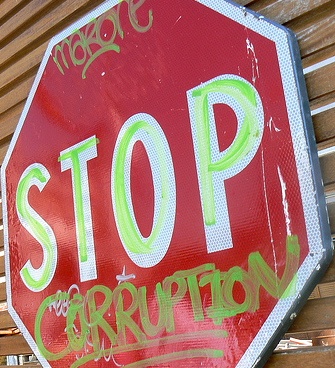
Head of the United Nations Office on Drugs and Crime urged public and private sectors in the world’s major economies to implement measures to combat corruption, saying the vice undermined societies and had the capacity to trigger civil unrest. Yury Fedotov, the UNODC Executive Director is a former Deputy Permanent Representative of the Russian Federation to the United Nations and colleague of mine during our mutual tenure. Mr. Fedotov’s office issued the following Statement:
---
UNODC Executive Director Yury Fedotov has called on public and private businesses to put in place urgent concrete measures to stem the tide of corruption. "As recent events in North Africa and the Middle East have demonstrated, corruption has the power to shake the very foundations of society. Even in regions where peace and prosperity prevail, corruption takes a heavy toll", said Mr. Fedotov.
Addressing the conference ' Joining Forces against Corruption: G-20 Business and Government', organised by the French Presidency of the G-20 and the OECD, with the support of UNODC, Mr. Fedotov said it is time for the G-20 to turn anti-corruption commitments into action: "The international community is grateful for the private sector's support for the United Nations Convention against Corruption. But now it's time for business to move beyond declarations to concrete actions. The private sector can play a key role to enhance accountability and transparency and to strengthen the global economy".
The event in Paris follows upon the commitments taken by G-20 Leaders at the Seoul Summit in November 2010 where the G-20 adopted an Anti-Corruption Action Plan that recognizes the centrality of the United Nations Convention against Corruption. The Plan provides a common approach and an opportunity for the G-20 to lead by example in the global fight against corruption. It also recognizes that the private sector has an essential role to play.
The conference explores public-private cooperation in implementing the G-20 Anti-Corruption Plan, the challenges of anti-corruption compliance; fighting corruption in public procurement; and reviews sector-specific anti-corruption initiatives. The meeting will also reveal commercial practices most exposed to corruption and come up with specific steps on what governments and businesses can take to meet the goals of the G-20 Anti-Corruption Plan.
Mr. Fedotov presented four concrete proposals on what the business community can do to eliminate corruption: adopt private sector anti-corruption policies aligned with the UN Convention against Corruption; establish a credible mechanism to review own commitments to integrity; invest in strengthening public integrity in developing countries and invest in keeping corruption out of business supply chains.
"In October this year, the Conference of States Parties to the Convention against Corruption will meet in Marrakech, Morocco to take stock of global progress in preventing corruption. I hope that the private sector will use the months leading up to the Conference to develop specific policies and concrete steps to fight corruption", said Mr. Fedotov.
The G-20, established in 1999, is a forum for international economic development that promotes open and constructive discussion between industrial and emerging-market countries on key issues related to global economic stability. It encourages public-private partnerships and offers a significant opportunity for developing and implementing initiatives that engage the private sector in the global fight against corruption.
The UN Convention against Corruption is the first legally binding global anti-corruption instrument. It obliges States to prevent and criminalize corruption, promote international cooperation, recover stolen assets and improve technical assistance and information exchange.
It is apt that Mr. Fedotov’s statement highlights the problem of corruption in developed economies. Corruption is too frequently painted as a systemic problem of underdeveloped and developing states. However, it is a global issue. Worse, some of the worst abuses in the poorer countries are not committed by local politicians or businessmen/women. Rather, poorer states are frequently preyed upon by the more nimble merchants of the developed economies. The injury may be in the form of toxic wastes dumped, local labor force exploited or quickly moving capital employed to raid rather than invest.
The poorer economies though still need legitimate foreign investment and expertise. Trade ultimately can carry greater opportunities than risks. A consistent commitment to the rule of law is best code for both protection and to attract legitimate international business partners.
For More Related Reports:
---“Combating Corruption/World Bank”---
diplomaticallyincorrect.org/films/movie/combating-corruptionworld-bank-initiative/23572
---“Cheat One of Us, Cheat All” ---
diplomaticallyincorrect.org/films/movie/cheat-one-of-us-world-bank/26240
By Ambassador Muhamed Sacirbey
Face Book at “Diplomatically Incorrect”
Twitter - DiplomaticallyX

